Peste des petits ruminants, also known as sheep and goat plague, is highly contagious, affecting small ruminants such as sheep and goats as well as a number of wild species, such as ibex and gazelles. Although cattle and pigs can be infected, they do not develop any clinical signs.
PPRV is transmitted through direct contact of infected and susceptible animals, via aerosolised bodily fluids over short distances, or through contaminated feed, water, pastures and animal housing. Sources of PPRV include secretions from the eyes, nose, and mouth of infected animals, as well as their faeces.
Peste des petits ruminants can have severe socio-economic impacts on the income of farmers and rural communities when outbreaks occur and are not controlled.
The disease is widespread in many parts of the world including most of Africa, the Middle East, the Indian sub-continent (Pakistan, India, Bangladesh, etc.) and China. The only confirmed outbreak of PPR in Europe was in Georgia in 2016.
In 2015, WOAH and FAO set the challenge of eradicating PPR by 2030. High-quality effective PPRV vaccines are readily available, and diagnostic tools are rapid and reliable. With global support, eradication should be possible.
Please see the Defra website for advice on how to spot and report the disease.
Clinical signs
PPRV causes disease with an array of clinical signs. It also causes immunosuppression, which makes affected animals more likely to pick up other infections.
- Fever
- Eye and nasal discharges
- Sores in the mouth
- Diarrhoea
- Listlessness
- Respiratory signs (coughing and pneumonia)
- Abortion
- Death, with case fatality rates as high as 90% (though more commonly around 20%)
Virology
Peste des petits ruminants virus (PPRV) belongs to the Paramyxoviridae family, genus Morbillivirus. It is closely related to canine distemper virus and the human pathogen measles virus.
The virus has a membrane envelope and a nucleocapsid which contains the negative sense single-stranded RNA genome.
Pirbright's research on peste des petits ruminants
As a Reference Laboratory for peste des petits ruminants, The Pirbright Institute works closely with the Food and Agriculture Organisation of the United Nations (FAO) and the World Organisation for Animal Health (WOAH), to globally support the detection and control of PPR.
There is currently a global programme to eradicate PPR, led by WOAH and the FAO, and The Pirbright Institute is working to assist this programme. While there are effective vaccines available to prevent PPR, they currently do not provide a DIVA (Distinguish Infected and Vaccinated Animals) capability. Recent work at The Pirbright Institute has been to develop and validate novel vaccines and to improve current diagnostics, such as the lateral flow assay for on-site testing.
In addition, as a WOAH Reference Laboratory for PPR, we work to help other laboratories with their diagnosis and surveillance, promoting best practice and continuously monitoring and improving diagnostics. As part of this effort, we are members of a global network of PPR diagnostic laboratories. We are also engaged in several collaborative projects with international groups of scientists.


